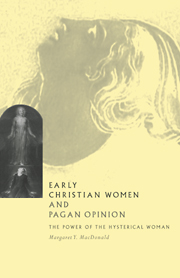Book contents
- Frontmatter
- Contents
- Preface
- List of abbreviations
- Introduction
- PART ONE Pagan reaction to early Christian women in the second century CE
- PART TWO Celibacy, women, and early church responses to public opinion
- PART THREE Marriage, women, and early church responses to public opinion
- General conclusion
- Bibliography
- Index
PART ONE - Pagan reaction to early Christian women in the second century CE
Published online by Cambridge University Press: 15 December 2009
- Frontmatter
- Contents
- Preface
- List of abbreviations
- Introduction
- PART ONE Pagan reaction to early Christian women in the second century CE
- PART TWO Celibacy, women, and early church responses to public opinion
- PART THREE Marriage, women, and early church responses to public opinion
- General conclusion
- Bibliography
- Index
Summary
The following constitutes an examination of the comments of second-century pagan authors who refer specifically to early Christian women. While many Christian works from the first and second centuries CE (including the New Testament) offer general indications of public opinion of the early church, the authors examined in this section explicitly characterize early Christians as outsiders to mainstream society. In concentrating on these earliest reactions, we are able to witness a new religious group gaining public attention for the first time. In studying these texts, we obtain a greater understanding of that fascinating period before Christianity became a recognizable force in the Roman Empire, when it was still a little-known movement, fiercely setting out to forge an identity.
Obviously, we cannot grasp fully how women figured in public opinion of early Christianity without taking into account how other religious groups in the Greco-Roman world were judged for the effect they had on women. Fortunately, David L. Balch provides a thorough investigation of how women featured in Greco-Roman criticism of various Eastern religions. Balch's analysis has led him to conclude that, ‘Roman ideals resulted in certain stereotyped criticisms of the Dionysus cult, the Egyptian Isis cult, and Judaism: they produced immorality (especially among Roman women) and sedition.’
- Type
- Chapter
- Information
- Early Christian Women and Pagan OpinionThe Power of the Hysterical Woman, pp. 49 - 126Publisher: Cambridge University PressPrint publication year: 1996

